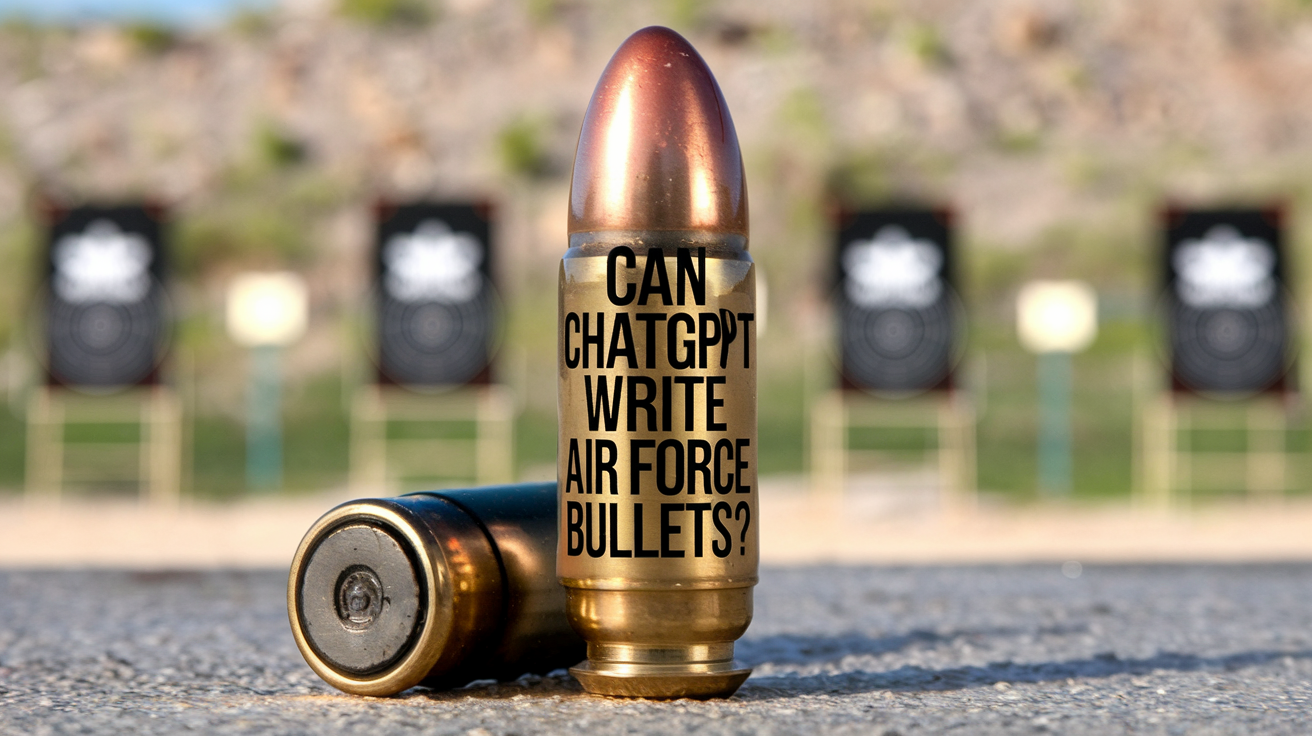Can Chatgpt Write Air Force Bullets?

In recent years, the integration of artificial intelligence (AI) into various professional domains has sparked significant interest and debate. One such area of exploration is the use of AI tools like ChatGPT to assist in writing Air Force bullets, which are concise, impactful statements used in performance evaluations and awards within the United States Air Force. This report delves into the potential of ChatGPT to streamline the process of crafting these narrative bullets, examining both its capabilities and limitations.
ChatGPT, developed by OpenAI, is a large-language model designed to generate human-like text based on the input it receives. Its application in writing Air Force bullets has been a topic of discussion among military personnel and AI enthusiasts alike. The tool's ability to quickly generate text has been noted as a significant advantage, potentially reducing the time and effort required to draft performance statements. However, as highlighted in a Military.com article, while ChatGPT can produce text rapidly, it may lack the nuanced understanding of military-specific language and context, which is crucial for creating effective Air Force bullets.
The use of AI in military writing is not without its challenges. Concerns about the authenticity and accuracy of AI-generated content have been raised, particularly in the context of sensitive military evaluations. Despite these concerns, some experts argue that using AI tools like ChatGPT is akin to employing a professional writing coach, as noted by the Society for Human Resource Management (SHRM). This perspective suggests that AI can serve as a valuable aid in the writing process, provided that users apply their own expertise to refine and verify the generated content.
Moreover, platforms such as EPR Bullets by AFSC and Air Force Narrative Statement Generator have emerged, offering structured approaches to using AI for crafting Air Force bullets. These resources provide templates and examples tailored to specific Air Force Specialty Codes (AFSC), further enhancing the utility of AI in this domain.
As the military continues to explore the integration of AI into its operations, understanding the balance between leveraging technology and maintaining human oversight becomes increasingly important. This report aims to provide a comprehensive analysis of ChatGPT's role in writing Air Force bullets, offering insights into its potential benefits and the considerations necessary for its effective use.
You can also visit Oncely.com to find more Top Trending AI Tools. Oncely partners with software developers and companies to present exclusive deals on their products. These deals often provide substantial discounts compared to regular pricing models, making it an attractive platform for individuals and businesses looking to access quality tools and services at more affordable rates.
Some common types of products and services featured on Oncely include a wide range of software tools across various categories, including productivity, marketing, design, development, project management, and more. Examples include project management platforms, SEO tools, social media schedulers, email marketing software, website builders, and graphic design tools.
One unique aspect of Oncely is its “Lifetime Access” feature, where customers can purchase a product once and gain ongoing access to it without any recurring fees. However, it’s important to note that the availability of lifetime access may vary depending on the specific deal and terms offered by the software provider.
Oncely also provides a 60-day money-back guarantee on most purchases, allowing customers to try out the products and services risk-free.
Oncely are hunting for the most fantastic AI & Software lifetime deals like the ones below or their alternatives:

Using ChatGPT for Air Force Bullet Writing
Overview of ChatGPT's Capabilities
ChatGPT, a language model developed by OpenAI, has been increasingly utilized for various writing tasks, including the crafting of Air Force bullet statements. The model's ability to generate text based on prompts makes it a valuable tool for creating concise and impactful bullet statements that align with Air Force standards. The use of AI in this context is part of a broader trend towards modernizing performance evaluations within the military, as highlighted by the Air Force EPB-OPB Builder, which emphasizes efficiency and excellence in processing achievements and responsibilities.
Structure and Format of Air Force Bullets
Air Force bullet statements are a unique form of writing that requires precision and clarity. These statements are typically used in performance evaluations and must adhere to specific guidelines. According to the Narrative Buddy, a tool designed to assist in writing these statements, the bullets should be standalone sentences that begin with a strong action verb and include at least one impact or result. They should be written in plain language, avoiding uncommon acronyms and abbreviations, and should not use personal pronouns.
Benefits of Using ChatGPT
- Efficiency and Time-Saving: One of the primary benefits of using ChatGPT for writing Air Force bullets is the significant reduction in time spent on paperwork. The AI system can quickly transform raw data into well-structured bullet statements, allowing service members to focus more on their mission and professional development. This aligns with the Air Force's commitment to accelerating change and innovation, as noted in the Air Force EPB-OPB Builder.
- Consistency and Standardization: ChatGPT helps maintain consistency in the format and style of bullet statements. By using a standardized approach, the AI ensures that all statements meet the required criteria, reducing the likelihood of errors and omissions. This is particularly important in a military context, where precision and uniformity are crucial.
- Adaptability and Customization: The AI's ability to adapt to different inputs and customize outputs based on specific requirements makes it a versatile tool. Users can provide feedback to refine the generated content, ensuring that the final product aligns with their expectations and the Air Force's standards. This adaptability is highlighted in the EPB Prompt V3, which suggests breaking prompts into smaller chunks for better processing.
Challenges and Considerations
- Operational Security (OPSEC): While ChatGPT offers numerous advantages, it is essential to consider operational security when using AI for military writing. Users must ensure that sensitive data is masked and that the AI does not inadvertently disclose classified information. The Air Force Narrative Statement Generator emphasizes the importance of following OPSEC guidelines when crafting narrative statements.
- Accuracy and Relevance: Although ChatGPT is capable of generating coherent text, the accuracy and relevance of the content depend on the quality of the input provided. Users must ensure that the information fed into the AI is accurate and up-to-date to produce meaningful and relevant bullet statements. This requires a careful review of the generated content to verify its correctness.
- Dependence on Technology: Relying heavily on AI for writing tasks may lead to a decrease in human involvement and oversight. It is crucial to strike a balance between leveraging AI capabilities and maintaining human judgment and expertise in the writing process. This balance is necessary to ensure that the final output meets the high standards expected in military documentation.
Future Prospects and Developments
The integration of AI in military writing is part of a broader effort to create an AI-ready workforce, as discussed in the Joint Force Quarterly. The military's focus on developing AI skills and capabilities suggests that the use of tools like ChatGPT will continue to grow. As AI technology advances, it is likely that these tools will become even more sophisticated, offering enhanced features and functionalities for writing and other tasks.
The potential for AI to revolutionize military writing is significant, but it also requires careful consideration of the ethical and practical implications. Ensuring that AI is used responsibly and effectively will be key to maximizing its benefits while minimizing potential risks.
Conclusion
In summary, ChatGPT offers a powerful solution for writing Air Force bullet statements, providing efficiency, consistency, and adaptability. However, it is essential to address challenges related to operational security, accuracy, and dependence on technology. As the military continues to embrace AI, the role of tools like ChatGPT in enhancing performance evaluations and other writing tasks is likely to expand, contributing to a more efficient and effective military workforce.
Challenges and Limitations of ChatGPT in Military Contexts
Understanding ChatGPT's Limitations in Military Applications
ChatGPT, a large language model developed by OpenAI, has been explored for various applications, including military contexts. However, its use in such sensitive and complex environments presents several challenges and limitations. One significant limitation is its inability to access or infer specific, context-sensitive information that is crucial in military settings. For instance, while ChatGPT can generate text based on input data, it lacks the capability to understand nuanced military jargon or the specific requirements of military documents, such as Air Force bullets. This limitation is evident in its struggle to produce industry-specific content without explicit guidance (Military.com).
Ethical and Privacy Concerns
The use of AI in military applications raises ethical and privacy concerns. ChatGPT, like other AI models, processes large amounts of data, which can include sensitive military information. The potential misuse of this data or breaches in privacy can have severe implications. Ethical considerations also extend to the transparency and accountability of AI-generated content. The military must ensure that AI tools like ChatGPT are used responsibly, with clear guidelines and oversight to prevent misuse (MadSci Blog).
Lack of Contextual Sensitivity and Specificity
ChatGPT's general-purpose design means it often lacks the contextual sensitivity required for military applications. For example, when tasked with generating content for a defense industry resume, ChatGPT tends to produce generic responses that do not align with the specific needs of military personnel transitioning to civilian roles. This lack of specificity can result in content that fails to meet the precise requirements of military documentation, such as Air Force bullets, which demand a high degree of accuracy and relevance (Military.com).
Dependence on User Input and Expertise
The effectiveness of ChatGPT in generating military-related content heavily depends on the quality and specificity of user input. Users must provide detailed and accurate information for the model to produce useful outputs. This requirement can be a significant limitation, as it necessitates a level of expertise and understanding of military contexts that not all users possess. Consequently, while ChatGPT can assist in drafting documents, it cannot replace the need for human expertise and oversight in military applications (HogoNext).
Challenges in Adapting to Military Training and Operations
Integrating AI like ChatGPT into military training and operations poses additional challenges. The military environment is dynamic and complex, requiring AI systems to adapt to rapidly changing scenarios. ChatGPT's current capabilities may not be sufficient to handle the intricacies of military operations, which often involve real-time decision-making and situational awareness. Moreover, the model's reliance on pre-existing data limits its ability to generate innovative solutions or adapt to new military strategies and technologies (NDU Press).
Conclusion
In summary, while ChatGPT offers potential benefits in document preparation and content generation, its application in military contexts is fraught with challenges. These include ethical and privacy concerns, a lack of contextual sensitivity, dependence on user input, and difficulties in adapting to military training and operations. Addressing these limitations requires careful consideration and the development of robust frameworks to ensure the responsible and effective use of AI in military settings.
Ethical Considerations in Using AI for Military Document Drafting
Privacy and Data Security
The use of AI, such as ChatGPT, in drafting military documents raises significant privacy and data security concerns. AI systems require access to vast amounts of data to function effectively, which can include sensitive military information. The potential for data breaches or unauthorized access to this information is a critical concern. According to a report by Military.com, there are apprehensions about how sensitive resume information could be used when employing AI tools for document drafting. This concern extends to military documents, where the stakes are considerably higher due to the potential exposure of classified information.
Moreover, the ethical principles adopted by the U.S. Department of Defense (DoD) emphasize the need for AI systems to be reliable and governable, ensuring that they operate within secure and controlled environments (source). The principles highlight the importance of maintaining robust security measures to protect against unauthorized access and data leaks, which is crucial when AI is used in military contexts.
Authenticity and Integrity of Information
The authenticity and integrity of information generated by AI systems are paramount, especially in military document drafting. AI tools like ChatGPT can generate content quickly, but they may lack the nuanced understanding required to ensure the accuracy and relevance of military-specific information. As noted in a Military.com article, AI-generated content can sometimes misrepresent the scale or context of the information, which could lead to inaccuracies in military documents.
The DoD's ethical principles for AI stress the need for traceability and transparency in AI systems (source). This means that AI-generated content should be auditable and verifiable, ensuring that any information produced can be traced back to its source and validated for accuracy. This is particularly important in military settings, where the integrity of information can have significant operational implications.
Bias and Fairness
AI systems are susceptible to biases that can affect the fairness and impartiality of the content they generate. This is a critical ethical consideration in military document drafting, where unbiased and equitable information is essential. The DoD has committed to minimizing unintended bias in AI capabilities, as outlined in their ethical principles (source).
Bias in AI can arise from the data used to train these systems, which may not fully represent the diversity of military operations or personnel. This can lead to skewed perspectives or the marginalization of certain groups within military documents. Ensuring fairness in AI-generated content requires ongoing evaluation and adjustment of the algorithms and data sets used, as well as a commitment to equitable representation in all military documentation.
Accountability and Responsibility
The use of AI in military document drafting raises questions about accountability and responsibility. When AI systems generate content, it can be challenging to determine who is accountable for the information produced. The DoD's ethical principles emphasize the need for responsible AI use, where personnel exercise appropriate judgment and care in the deployment of AI capabilities (source).
In practice, this means that military personnel must remain actively involved in the AI document drafting process, ensuring that the content aligns with military standards and objectives. Human oversight is crucial to verify the accuracy and appropriateness of AI-generated content, and to make necessary adjustments based on operational requirements and ethical considerations.
Impact on Human Expertise and Decision-Making
The integration of AI in military document drafting can impact human expertise and decision-making processes. While AI can enhance efficiency and reduce the workload on military personnel, there is a risk that over-reliance on AI could diminish human expertise and critical thinking skills. The National Defense University Press highlights the importance of maintaining an AI-ready workforce that can effectively integrate AI technologies without compromising human capabilities.
AI should be viewed as a tool to augment human decision-making, not replace it. Military personnel must be trained to work alongside AI systems, leveraging their capabilities while retaining the ability to make informed, ethical decisions. This balance is essential to ensure that AI enhances, rather than undermines, the effectiveness and integrity of military operations.
In conclusion, the ethical considerations surrounding the use of AI for military document drafting are multifaceted and require careful attention to privacy, authenticity, bias, accountability, and the impact on human expertise. By adhering to established ethical principles and maintaining robust oversight, the military can harness the benefits of AI while mitigating potential risks.
References
- https://www.reddit.com/r/AirForce/comments/14ricz1/chatgpt_write_my_narrative_epr/
- https://www.reddit.com/r/AirForce/comments/zl51cs/updated_chatgpt_prompt_write_10_bullets/
- https://www.ai.mil/blog_02_26_21-ai_ethics_principles-highlighting_the_progress_and_future_of_responsible_ai.html
- https://www.atlanticcouncil.org/in-depth-research-reports/report/how-modern-militaries-are-leveraging-ai/
- https://www.military.com/veteran-jobs/i-used-chatgpt-write-defense-industry-resume-what-happened.html
- https://media.defense.gov/2019/Oct/31/2002204459/-1/-1/0/DOD-AI-PRINCIPLES-SUPPORTING-DOCUMENT-D.PDF
- https://onlinelibrary.wiley.com/doi/full/10.1155/2023/8676366
- https://airforcehub.com/ai-for-epb-oprs/
- https://www.ai.mil/docs/Ethical_Principles_for_Artificial_Intelligence.pdf
- https://www.defense.gov/News/Releases/Release/Article/2091996/dod-adopts-ethical-principles-for-artificial-intelligence/
- https://blog.peigenesis.com/the-pros-and-cons-of-using-ai-in-the-military
- https://ndupress.ndu.edu/Media/News/News-Article-View/Article/3449468/an-ai-ready-military-workforce/
- https://media.defense.gov/2019/Oct/31/2002204458/-1/-1/0/DIB_AI_PRINCIPLES_PRIMARY_DOCUMENT+.PDF
- https://mwi.westpoint.edu/artificial-intelligence-real-risks-understanding-and-mitigating-vulnerabilities-in-the-military-use-of-ai/
- https://www.reddit.com/r/AirForce/comments/193f5nb/air_force_epbopb_narrative_builder_a_chatgpt4/





